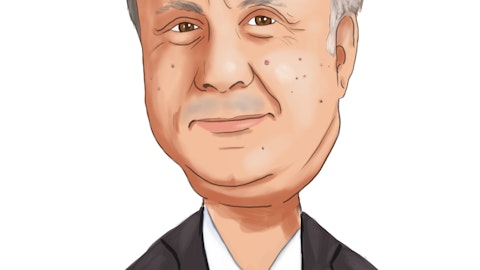Ralph D’Amico: It’s possible, right? I mean, it’s going to be de minimis in just noise. I mean, I think our targets to be able to completely exit, right? But I can’t — I can’t give you a 100% certainty, right? So there is some room for some noise in that, right. If we get there by the end of calendar ’23 and put it in ’24, that’d be great. But there is some things in there that we don’t control, right? So there’s a little bit of wiggle room. But certainly, I hope it’s zero in’24.
Chad Stephens: And I don’t want to . But once we get these couple of non op working interest packages out the door and we just signed one as Ralph alluded to and we’re working another one as we speak. It’s — 92% to 95% of our volumes will be royalty. So the other be derogatory, but they’re just material to the it just won’t matter .
Jeffrey Campbell: Okay. That’s fine. And I just wanted to ask one last question. In the fourth quarter and afterward, in the subsequent events, you showed continued net royalty acreage acquisitions. And I’m assuming that they were in the SCOOP and in the Haynesville, I think that was articulated in the press release. Can you comment on the percentage split between the SCOOP and the Haynesville that you’re acquiring these days? And will these percentages be similar in the 2023 acquisitions to come?
Ralph D’Amico: So I would say that third to — probably closer to three quarters of the acquisitions are in the Haynesville and the remainder is in — by number of acres or deal value and the rest is in in the Springboard area of the SCOOP. The Springboard is a much smaller geographic area, right? And with all of the activity that Continental is doing in there, right, it becomes — it’s not as — we’re still finding very good value proposition there. But it’s not the same as it was a year ago, right? So the Haynesville, it’s got a much bigger footprint, right? And it gives us more opportunity in there. So I would say, yes, about three quarters would be Haynesville
Chad Stephens: Just to talk quickly about Springboard III. So there’s two — clearly Continental has the largest leasehold position in our area of interest. We have a kind of a boundary or an outline in which we’ve been acquiring minerals. And there were two things in play there. One, Harold Hamm was trying to take his company private, which he just successfully did here recently. And so he didn’t want to — he didn’t want to advertise too much of what he was doing there or drive his share price up too much by announcing good wells, good results in that area. And then secondly, they’ve been doing a bit of kind of well analysis that the best way to drill the wells and the best angles and the best — and there’s two different zones there and they’re testing both zones.
And once they finish some of this plants, they’ll get into what we call mow the grass scenario where those got five or six rigs and they’re just marching down the line drilling and developing these wells and that probably gets to a year away. But that’s what they’ve done before. That’s the way they always develop these areas. They did it in Springboard I asset, you can see what they did up in Grady Count in Springboard I. So they’ll do the same thing in Springboard III and we’re excited about that. And as we’ve acquired minerals in this area, we’ve run up against Continental, who’s got Franklin and Nevada who funds them and buys minerals underneath the wells that they drill. So we’re fortunate to have gotten the position we have in Springboard III ahead of Continental.
Jeffrey Campbell: Got it. Okay. That’s very helpful. I appreciate it. Thank you.
Operator: Thank you. Our next question has come from the line of Nicholas Polk with Seaport Research. Please proceed with your questions.
Nicholas Pope: Hey, good morning, everyone.
Chad Stephens: Hey, Nick.
Nicholas Pope: Real quick, just looking at the recent quarter, you all switch to being a cash tax payer. I was curious what thoughts are kind of over the near term? What that kind of income tax rate looks like? How much you’ll expect to be deferred? Now that kind of we’re in that regime?
Chad Stephens: Yes. It is — it’s a high quality problem, right? I mean, as we’re not drilling wells and not generating any IDCs, much like every other mineral company out there where we’ve now become a cash taxpayer, right? And our estimate is that, it’s roughly in the low teens is what your cash tax rate is, right? The tax rate itself is a bit higher, but you can defer some of it. So our estimate is going to be in the low teens.
Nicholas Pope: Got it. It’s been a long call. That’s all I had. I think everything else has been asked guys.
Operator: Thank you. We have reached the end of our question and answer session. I would now like to hand the call back over to Chad Stephens for closing comments.





